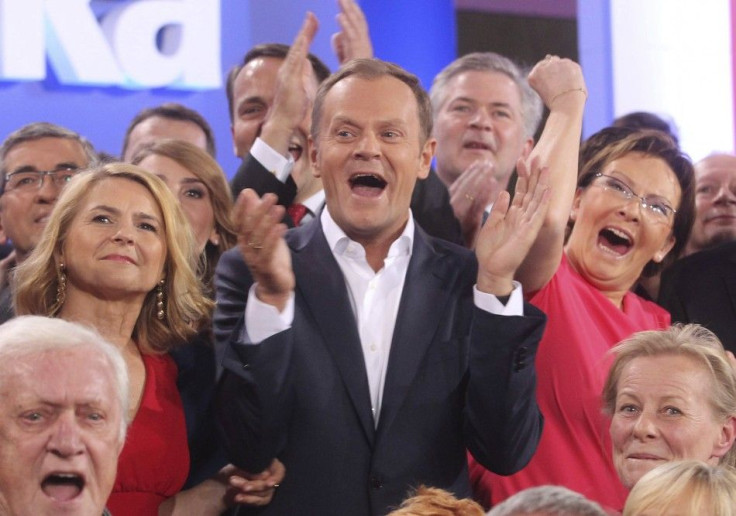Poland Election: PM Wins Second Term, Will Keep Old Coalition for Now

Prime Minister Donald Tusk, leader of the center-right pro-market Civic Platform (PO) party, won re-election in Poland Sunday night. For the first time since the fall of communism in 1989, the major political party in Poland has maintained its grip on power. The fairly fought election in the formerly communist country establishes the country's democratic and economic stability.
I want to thank all Poles for ... confirming that these four years had a profound importance for Poland, Tusk told crowds of his supporters after the announcement of preliminary results. During the next four years, we will all share the burden of responsibility for our homeland.
Since 2007, the Civic Platform has strived to improve relations with Russia and the West. Tusk has also encouraged pro-market, pro-European Union actions as well as gradual changes for economic stability rather than radical economic reforms.
The party won 39 percent of the vote, 9 points ahead of their closest competitor, nationalist-conservative Law and Justice Party (PiS), which had 29.89 percent of the vote. The Law and Justice Party's euroskepticism is a stark contrast to the Civic Platform's pro-EU stance. Former Prime Minister Jaroslaw Kacynski, the Law and Justice party's leader, says he plans to win election in 2015.
Most surprisingly, Palikot's Movement (RP) finished third. The new populist party, led by eccentric politician and millionaire Janusz Palikot received 10 percent of the votes. The party embraces pro-abortion, pro-gay, and pro-civil rights legislation that appeals to a younger voting bloc.
The Civic Platform's current coalition partner, the Polish People's Party (PSL), which represents Poland's rural interests, ranked fourth with 8.36 percent of the vote.
In an interview with Polish weekly newspaper Polityka, PM Tusk said he sees no need to seek a new coalition party immediately as Poland currently holds the EU's rotating presidency through Dec. 31. Although he does not want any shake-ups at this point in time, Tusk plans to make Cabinet changes early in 2012.
Although the EU presidency does not give any real power to Poland, it does have symbolic significance. This is the first time the ex-communist country has the presidency. Polish leaders hope they can maintain stability during the six-month term while EU political leaders try to solve the Euro zone crisis.
However, looming economic problems in Poland means Tusk must build a new coalition before Poland's booming economy loses its momentum.
While Poland was the only EU country to escape recession in 2009, economists estimate Poland will not survive the next European economic crisis. There are fears that the country's economy is not immune to the global recession as GDP estimates for the second half of 2011 are significantly lower than earlier this year.
It looks inevitable that there is going to be as second wave of economic downturn and that it's going to hit Poland. says Aleks Szczerbiak, a professor of politics at the University of Sussex and author of Poland Within the European Union: New Awkward Partner or New Heart of Europe? The government is not in great shape. This time it's under real pressure to cut back on public finances at a time when the economy is contracting.
According to the Polish newspaper Gazeta Wyborcza, however, a majority of voters trust the Civic Platform will be successful at coping with impending economic hardships.
© Copyright IBTimes 2024. All rights reserved.





















